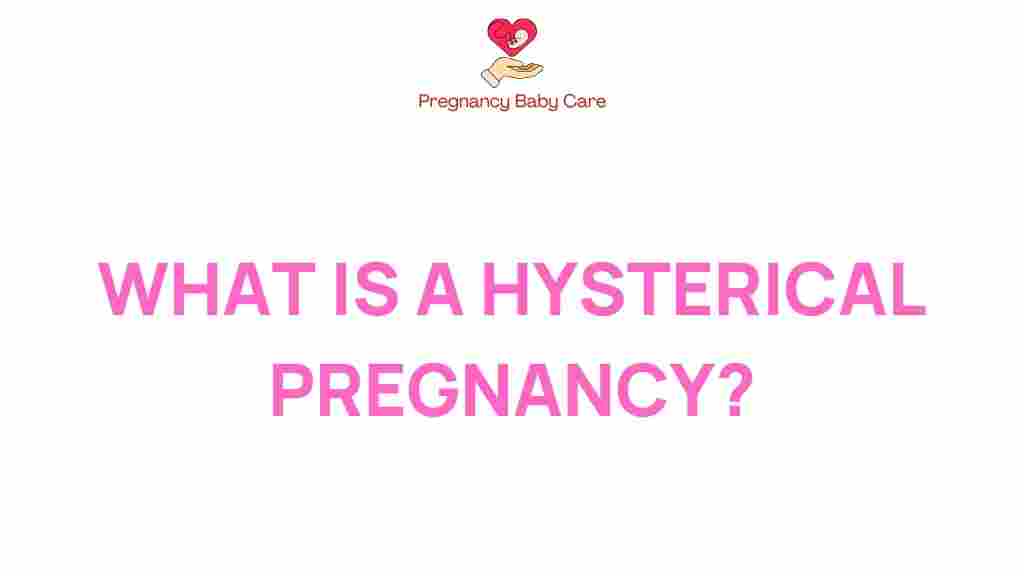Unveiling Hysterical Pregnancy: What You Need to Know
Hysterical pregnancy, also known as pseudocyesis, is a fascinating yet often misunderstood condition that can profoundly affect emotional and mental health. This article aims to provide a comprehensive understanding of hysterical pregnancy, its symptoms, diagnosis, and the misconceptions surrounding it. We will also explore the importance of pregnancy awareness and support for those who may be experiencing this condition.
Understanding Hysterical Pregnancy
Hysterical pregnancy is a rare psychological condition where an individual believes they are pregnant and exhibits various signs of pregnancy, despite there being no actual fetus present. This condition can occur in both women and, in rare cases, men. Understanding the emotional and mental health aspects of hysterical pregnancy is crucial for providing effective support and care.
Symptoms of Hysterical Pregnancy
The symptoms of hysterical pregnancy can mimic those of a regular pregnancy, which can often lead to confusion for the individual experiencing it and their healthcare providers. Common symptoms include:
- Abdominal swelling
- Weight gain
- Nausea and vomiting
- Breast tenderness and changes
- Fatigue
- Absence of menstruation
While these symptoms can be distressing, it’s important to understand that they stem from psychological factors rather than physiological ones.
Diagnosis of Hysterical Pregnancy
Diagnosing hysterical pregnancy requires a thorough assessment by healthcare professionals. The process typically involves:
- Medical History Review: A detailed history is taken to rule out actual pregnancy and other medical conditions.
- Physical Examination: A physical examination can help identify signs that may appear similar to pregnancy.
- Pregnancy Tests: Blood and urine tests to confirm the absence of hCG (human chorionic gonadotropin), the hormone produced during pregnancy.
- Ultrasound Examination: An ultrasound may be conducted to ensure there is no developing fetus.
It is essential to approach the diagnosis with sensitivity, as the emotional health of the individual is a significant factor in their overall well-being.
Emotional and Mental Health Considerations
The emotional and mental health implications of hysterical pregnancy can be profound. Individuals may experience feelings of loss, anxiety, and depression, especially upon realizing that they are not actually pregnant. Therefore, providing support is crucial.
Importance of Emotional Support
It is vital for friends, family, and healthcare providers to offer understanding and compassion. Here are some ways to provide emotional support:
- Listen without judgment and validate feelings.
- Encourage open communication about fears and anxieties.
- Suggest professional help, such as therapy or counseling.
Emotional support can significantly impact recovery and help individuals cope with the psychological aspects of hysterical pregnancy.
Common Misconceptions About Hysterical Pregnancy
There are several misconceptions about hysterical pregnancy that can exacerbate feelings of shame or confusion for those affected:
- Myth: Hysterical pregnancy is a deliberate act.
- Truth: It is a psychological condition that individuals cannot control.
- Myth: Only women experience hysterical pregnancy.
- Truth: While predominantly seen in women, men can also experience pseudocyesis.
- Myth: Hysterical pregnancy is not a real medical condition.
- Truth: It is recognized in medical literature and requires proper diagnosis and treatment.
Dispelling these myths is crucial for raising awareness and ensuring that individuals feel supported rather than stigmatized.
The Role of Pregnancy Awareness
Increasing pregnancy awareness can help individuals better understand their bodies and the psychological factors that influence their health. Here are some key aspects of pregnancy awareness:
- Understanding the changes that occur during pregnancy.
- Recognizing the difference between physical symptoms and psychological conditions.
- Encouraging open discussions about mental health and emotional well-being.
Education on these topics can empower individuals to seek help and support when needed.
Steps to Take if You Suspect Hysterical Pregnancy
If you or someone you know is experiencing symptoms of hysterical pregnancy, consider the following steps:
- Consult a Healthcare Professional: It’s crucial to seek a medical evaluation to confirm the absence of pregnancy and discuss symptoms.
- Consider Mental Health Support: Engaging with a mental health professional can address underlying psychological issues.
- Build a Support Network: Surround yourself with understanding friends and family who can provide emotional support.
Troubleshooting Tips for Coping with Hysterical Pregnancy
Dealing with hysterical pregnancy can be overwhelming, but there are coping strategies that can help manage the emotional and mental health aspects:
- Journaling: Writing down feelings can help process emotions and clarify thoughts.
- Mindfulness and Relaxation Techniques: Practices such as meditation, yoga, or deep breathing can reduce anxiety.
- Education: Learning more about the condition can empower individuals and reduce feelings of isolation.
- Connect with Support Groups: Joining a support group can provide a sense of community and shared experiences.
These strategies can help individuals navigate their feelings and promote emotional healing.
Conclusion
Hysterical pregnancy, or pseudocyesis, is a complex condition that intertwines emotional and mental health with physical symptoms. Understanding its symptoms, diagnosis, and the importance of support can help demystify this condition, reducing stigma and encouraging those affected to seek help. By raising awareness and providing emotional support, we can foster a more compassionate environment for individuals experiencing hysterical pregnancy.
If you or someone you know is struggling with the implications of hysterical pregnancy, consider reaching out to a healthcare provider or mental health professional. You are not alone, and support is available. For more resources on pregnancy and mental health, visit Mental Health America and connect with others who understand what you’re going through.
For more information on pregnancy awareness and support, check out this guide on understanding emotional health during pregnancy.
This article is in the category Pregnancy and created by PregnancyBabyCare Team
